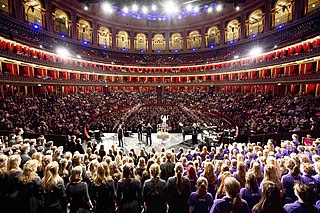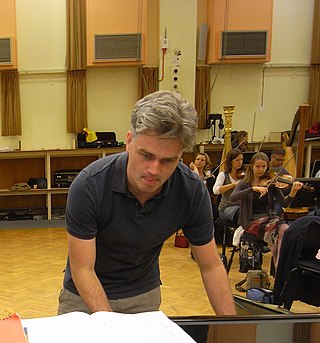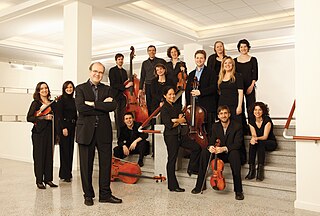
Sir Simon Denis Rattle is a British conductor with German citizenship. He rose to international prominence during the 1980s and 1990s, while music director of the City of Birmingham Symphony Orchestra (1980–1998). Rattle was principal conductor of the Berlin Philharmonic from 2002 to 2018, and music director of the London Symphony Orchestra from 2017 to 2023. He has been chief conductor of Bavarian Radio Symphony Orchestra since September 2023. Among the world's leading conductors, in a 2015 Bachtrack poll, he was ranked by music critics as one of the world's best living conductors.
Raymond John Leppard was a British-American conductor, harpsichordist, composer and editor. In the 1960s, he played a prime role in the rebirth of interest in Baroque music; in particular, he was one of the first major conductors to perform Baroque opera, reviving works by Claudio Monteverdi and Francesco Cavalli. He conducted operas at major international opera houses and festivals, including the Glyndebourne Festival where he led the world premiere of Nicholas Maw's The Rising of the Moon, the Metropolitan Opera and the Royal Opera House. He composed film scores such as Lord of the Flies and Alfred the Great.

The Royal Scottish National Orchestra (RSNO) is a Scottish orchestra, based in Glasgow. It is one of the five national performing arts companies of Scotland. Throughout its history, the Orchestra has played an important part in Scotland’s musical life, including performing at the opening ceremony of the Scottish Parliament building in 2004.

Westminster Choir College (WCC) is an historic conservatory of music, currently operating on the campus of Rider University, in Lawrenceville, New Jersey. Rider's College of Arts and Sciences consists of Westminster Choir College and an additional three schools.
Dame Jane Alison Glover is a British conductor and musicologist.
Roman Hurko is a New York based composer who specializes in Byzantine Rite Music.

Royal Northern Sinfonia is a British chamber orchestra, founded in Newcastle upon Tyne and currently based in Gateshead. For the first 46 years of its history the orchestra gave most of its concerts at the Newcastle City Hall. It also gave monthly concerts in Middlesbrough town hall and at Stockton & Billingham Technical College in Billingham. Since 2004 the orchestra has been resident at The Glasshouse, formerly known as Sage Gateshead. In June 2013 Queen Elizabeth II bestowed the title 'Royal' on the orchestra, formally naming it Royal Northern Sinfonia.

The National Youth Choir, formerly known as the National Youth Choirs of Great Britain and the British Youth Choir, is a family of choirs for outstanding young singers, and those with outstanding potential, in the United Kingdom. It comprises five choirs for around 900 children and young people between the ages of 9 and 25:

Simon Halsey, CBE is an English choral conductor. He is the chorus director of the City of Birmingham Symphony Chorus, a position he has held since 1983, and has been chorus director of the London Symphony Chorus since 2012. He is also artistic director of the Berlin Philharmonic Youth Choral Programme and the director of the BBC Proms Youth Choir, and conductor laureate of the Berlin Radio Choir. He is professor and director of choral activities at the University of Birmingham.

Edward Gardner is an English conductor. While still studying at the Royal Academy of Music in the late 1990s, he began his professional career as a choral conductor and repetiteur. Among other early posts, he was music director of Glyndebourne on Tour from 2004 to 2007. Gardner was music director of English National Opera from 2007 to 2015. From 2010 to 2016, he was principal guest conductor of the City of Birmingham Symphony Orchestra, and since 2013, he has been principal guest conductor of the Bergen Philharmonic Orchestra. Since 2021, he has been principal conductor of the London Philharmonic Orchestra. In 2022, he also became artistic advisor of the Norwegian National Opera and Ballet, where he is scheduled to become the music director in 2024.
Andrew Keith Wailes is an Australian conductor and music director. Winner of the Australasian International Choral Conducting Competition in Brisbane in 1999, he is the current artistic director and Chief Conductor of the Royal Melbourne Philharmonic Choir and Orchestra, Principal Conductor of the Melbourne University Choral Society, and music director and Conductor of the Box Hill Chorale. From 1999 to 2020 he served as artistic director of The Australian Children's Choir, and for a decade was Director of the Australian Catholic University Melbourne Campus Choir. He is a former president of the Australian Intervarsity Choral Societies Association, and is a former Artistic Administrator and artistic director of The Chamber Strings of Melbourne.
The London Philharmonic Choir (LPC) is one of the leading independent British choirs in the United Kingdom based in London. The patron is Princess Alexandra, The Hon Lady Ogilvy and Sir Mark Elder is president. The choir, comprising more than 200 members, holds charitable status and is governed by a committee of 6 elected directors. As a charity, its aims are to promote, improve, develop and maintain education in the appreciation of the art and science of music by the presentation of public concerts.

Northern Ireland Opera is Northern Ireland's national opera company.

Ben Parry is a British musician, composer, conductor, singer, arranger and producer. He is the director of London Voices and was formerly artistic director of the National Youth Choir.
Oliver Mears is an English opera director.
The Faculty of Music at the University of Toronto is one of several professional faculties at the University of Toronto. The Faculty of Music is located at the Edward Johnson Building, just south of the Royal Ontario Museum and north of Queen's Park, west of Museum Subway Station. MacMillan Theatre and Walter Hall are located in the Edward Johnson Building. The Faculty of Music South building contains rehearsal rooms and offices, and the Upper Jazz Studio performance space is located at 90 Wellesley Street West. In January 2021, the Faculty announced Dr. Ellie Hisama as the new Dean starting July 1, 2021.
Patrick Russill is an English choral conductor and Professor of Organ in the Royal College of Music.

Black conductors are musicians of African, Caribbean, African-American ancestry and other members of the African diaspora who are musical ensemble leaders who direct classical music performances, such as an orchestral or choral concerts, or jazz ensemble big band concerts by way of visible gestures with the hands, arms, face and head. Conductors of African descent are rare, as the vast majority are male and Caucasian.

Roy Frederick Wales BEM was a British choral, orchestral and operatic conductor, and a recipient of a British Empire Medal for Services to Choral Music in HM the Queen's 2020 New Year Honours.

Bernard Labadie is a Canadian conductor.












